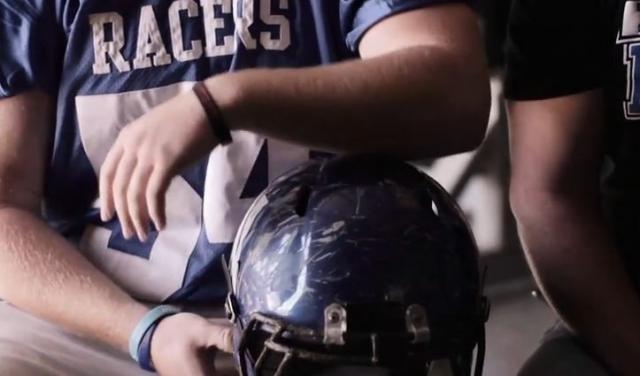The most recent consensus statement on concussion in sport (1) states that "rule enforcement may be a critical aspect of modifying injury risk."
But, while rule changes in 1976 eliminated, at least in theory, the head and face as a primary and initial contact area for blocking and tackling, and while illegal helmet-to-helmet contact has been a point of emphasis in rules enforcement at the high school level in recent years, officials are clearly not calling all illegal helmet contact. Far from it. The result, as I found out last year during the filming of MomsTEAM's documentary, The Smartest Team, is that helmet-to-helmet contact is extremely commonplace between players on the offensive and defensive line.
As David Meyer says in the film about his son Matt, an offensive lineman, "he's got to be moving forward. It's a full body motion. So, it becomes difficult to control. I mean if he intentionally tries not to make head contact, then the likelihood is that the person he is going against is going to be putting his helmet on his chin, and that's really bad." During the same interview, Matt candidly admitted, while displaying his heavily-scuffed helmet, that, as a linemen, he engages in helmet-to-helmet contact "pretty consistently on just about every play."
 Matt's admission, along with David's observation that it was "tough for linemen to just have hand contact and not have any helmet contact," illustrate exactly why lax enforcement of the rule against contact to the helmet and face as the initial point of contact is a problem in football that urgently needs to be addressed. If no player is penalized, then every player is going to see helmet-to-helmet contact, perversely, as a form of self-protection. The only way to eliminate the practice is to start calling penalties, to and to call them consistently.
Matt's admission, along with David's observation that it was "tough for linemen to just have hand contact and not have any helmet contact," illustrate exactly why lax enforcement of the rule against contact to the helmet and face as the initial point of contact is a problem in football that urgently needs to be addressed. If no player is penalized, then every player is going to see helmet-to-helmet contact, perversely, as a form of self-protection. The only way to eliminate the practice is to start calling penalties, to and to call them consistently.
I am in good company in calling for stricter rules enforcement:
- "Game officials (referees) should call all illegal helmet contact in games," urges Frederick O. Mueller, Ph D, longtime Director of the National Center for Catastrophic Sports Injury Research at the University of North Carolina at Chapel Hill (2). If they did, he believes, "the number of concussions and catastrophic injuries might be reduced. Coaches would no longer teach improper techniques and players would no longer use their helmeted heads if they know a penalty will be called."
- "Consistent and diligent enforcement of the rules ... may be one of the most effective ways to reduce the risk of sport-related concussions," argues MomsTEAM concussion expert, William P. Meehan, III, MD, Director of the Sports Medicine Clinic at Children's Hospital Boston in his book, Kids, Sports and Concussions (3);
- "When players flout the rules, officials must call penalties, When they don't, youth players become emboldened and go after the next kid more recklessly than the last," says Robert C. Cantu, MD, says in his book, Concussion and Our Kids (4);
The problem is that, while everyone agrees that stricter rules enforcement is needed, it simply isn't it happening. Why? There appear to be two principal reasons.
One is that it is constitutes the path of least resistance: it's easier for low-paid game officials to not call penalties than be subjected to the abuse of fans and coaches.
The other is that game officials, more often than not, are simply not accountable if they don't call penalties by the book. I agree with Dr. Cantu when he says, "game officials must be held accountable for the calls they make and, importantly, do not make. Every referee will miss a call or two - that's normal and part of the game. When dangerous plays are overlooked repeatedly, there need to be consequences. That official needs someone to tap him on the shoulder and say: 'Hey, these are kids. Let's protect them.'"
Unless and until that happens, I'm afraid to say, high school football linemen are going to continue to sustain a lot of the kind of helmet-to-helmet contact that not only scuffed up Matt Meyer's helmet, but worse, constitute the kind of repetitive, low-grade or subconcussive hits that researchers suggest may, over time, lead to long-term brain damage.
It's time for that to change. Now.
1. McCrory P, et al. Consensus statement on concussion in sport: the 4th International Conference on Concussion in Sport held in Zurich, November 2012. Br J Sports Med 2013;47:250-258.
2. Mueller, FO, Colgate B. Annual Survey of Football Injury Research 1931-2011, National Center for Catastrophic Sports Injury Research (February 2013) (accessed at http://www.unc.edu/depts/nccsi/2012FBInj.pdf).
3. Cantu R, Hyman M. Concussions and Our Kids. (Houghton Mifflin Harcourt 2012)
4. Meehan WP, Kids, Sports, and Concussions (Praeger 2011).



















